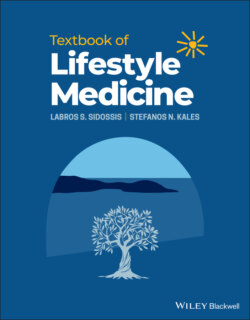Читать книгу Textbook of Lifestyle Medicine - Labros S. Sidossis - Страница 41
CHAPTER 3 Components of an Unhealthy Lifestyle Unhealthy Diets
ОглавлениеResearch has long linked specific nutrients (e.g., refined carbohydrates and added sugars, saturated and trans fatty acids [TFAs] and sodium), foods and food groups (e.g., sweets, sugary soft drinks, red meat, and processed meats), and specific dietary patterns (e.g., Western diet) with a number of diseases and conditions: CVD, cancer, diabetes, hypertension, liver and gallbladder diseases, and obesity. Moreover, diets low in whole grains, fruits and vegetables, nuts and seeds, and ω‐3/ω‐6 fatty acids seem to be the leading dietary risk factors of mortality the last two decades.
Regarding specific nutrients, high TFA intake increases the risk of all‐cause mortality, total CHD, and CHD mortality. Historically, studies on saturated fatty acids (SFAs) suggest positive associations with total and low‐density lipoprotein (LDL) cholesterol, coagulation markers, insulin resistance, and inflammation. Some studies have suggested that a long‐term diet high in SFAs could increase the risk for CVD and some cancers. However recent data do not fully support a direct connection between SFA and CVD.
An increased amount of dietary salt is an important risk factor for the development of hypertention and increased overall CVD risk. On the other hand, there is an inverse relation between fiber intake and all‐cause mortality. According to the WHO, approximately 3% of deaths worldwide are attributable to low fruit and vegetable consumption. Insufficient intake of fruits and vegetables increases the risk for gastrointestinal cancer, ischemic heart disease, and stroke. Most of the benefit of consuming fruits and vegetables comes from reduction in CVD risk, but fruits and vegetables also prevent cancer. Moreover, high consumption of red and processed meat has been associated with all‐cause mortality and with several types of cancer, diabetes, and CVD mortality. However, the consumption of whole‐grain cereals has been linked to improvements of metabolic syndrome (MetS) and its components: obesity, dyslipidemia, hypertension, and hyperglycemia or T2DM. According to the World Cancer Research Fund, up to 40% of cancers can be prevented by improving diet and increasing physical activity.
Therefore, shifting our diet from animal‐based foods to predominantly plant‐based foods may result in better health outcomes. In the following sections, we will focus on the most important components of an unhealthy diet.
